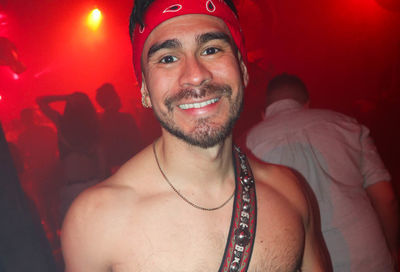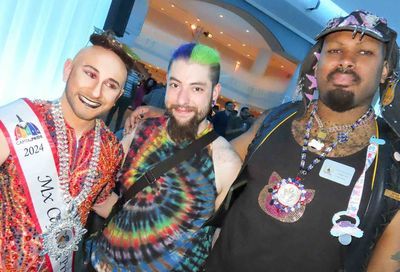Sister Schism
Trans debate continues at Michigan Womyn's Music Festival
Since 1976, women have been gathering in the wilds of Michigan, creating a space that, say attendees and organizers, is at once political, liberating, nurturing, and a host of other adjectives that leave visitors positively affected long after the last tent has been folded up. But these 30 years of the sensitively named Michigan Womyn’s Music Festival have not been entirely immune to the unpleasant grittiness that taints the rest of the less-inspired world.
On Aug. 21, a week after this year’s festival closed, a group called Camp Trans issued a press release titled ”Michigan Women’s [sic] Music Festival ends policy of discrimination against Trans women.” For years, Camp Trans activists have organized a small counter-festival near the entrance of the MWMF, protesting an apparently unwritten policy that excludes transgender women from the festival. Specifically, MWMF organizers point out, trans women are not banned from the MWMF — but nor are they invited.
Trying to figure out exactly what’s going on is a tricky minefield of semantics, syntax, respect, ”safe spaces,” politics and gender. Locally, the D.C.-based National Center for Transgender Equality (NCTE) has offered its two cents, with an Aug. 24 press release of its own. That release points first to activists for transgender equality celebrating a supposed change, before noting that MWMF is asking trans women not to attend the festival. So just what is going on?
Al Miner, a transgender man and former organizer of the D.C. Dyke March, who attended Camp Trans as an act of solidarity, says that regardless of any policy, he and other activists feel certain there was some type of sea change at this year’s festival. Camp Trans regularly sends an openly trans women to the MWMF ticket booth, who has been greeted by a written statement regarding who is — and who is not — welcome. A similar attempt this year was met with a ticket.
”Something did change. Something did shift,” Miner insists. ”Now trans women will probably feel safer knowing that this ‘policy’ is not being enforced. They’ll be able to go in and do education from the inside out.”
Festival organizer Lisa Vogel, the only MWMF founder still onboard, agrees with this basic assessment: At this year’s festival, an activist from Camp Trans identified herself to the MWMF box office as a transgender woman, yet a ticket agent sold her admission to the festival regardless. That changes nothing, however, in that there is no ban on transgender women. Rather, says Vogel, they are simply asked not to attend the festival out of respect for the sanctity of this ”womyn-born-womyn” space.
”We don’t feel like we have a policy on trans issues,” Vogel says. ”We have an intention of who the festival is for. We have a festival that is by and for ‘womyn-born-womyn.’ That seems to be very difficult for people to digest. We’re in a gray area, but gender is a gray area. The onus is on the individual. People want us to say we’re going to do ‘panty checks’ or define gender. We’re not going to do that. Our intention for the festival staff is to never ask anyone what their gender is.”
As the producer of the festival, Vogel’s statements regarding transgender women are the closest thing the festival has to an official policy. And as she explains it, it’s a self-policing arrangement, though there have been incidents over the years in which trans women have been asked to leave the site.
If, however, transgender women can purchase tickets to the festival and attend inconspicuously, says Mara Keisling, NCTE executive director, that’s beside the point.
”The point is that anytime there’s discrimination, it’s bad,” says Keisling, adding that she’s never attended the festival or the ancillary Camp Trans. ”The MWMF is one of the few places where a women’s space is discriminating against trans women. There’s almost nothing like that anymore. And it’s a very insidious form of discrimination. [Vogel] is saying you’ll discriminate against yourself if you’re good.”
Lesbian rocker SONiA of Baltimore has played the MWMF as both a soloist and with her band, disappear fear. She says she’s aware of the controversy, but adds that she’s never witnessed any related debates, political actions or the like when in Michigan. She seems sympathetic to both sides of the debate.
”For women 40 years and older, it was really like the only place they could relax and be themselves,” says SONiA, 37, adding that the festival has a huge lesbian following. ”I think a lot of lesbian and gay people today feel we don’t need to be separated out by our gender.”
Vogel agrees that questions about transgender exclusion/inclusion may take a generational bent. ”Camp Trans has become iconic for the younger generation,” Vogel observes. ”And I believe in protest politics for myself and for other people. I don’t villainize Camp Trans. I would love it if Camp Trans didn’t villainize the festival.”
Though there may be some breakdown by generation, Vogel says that she’s been ”flooded” by calls from women thanking her for explaining the need for ”womyn-born-womyn” space, adding she doesn’t imagine a MWMF invitation will be extended to transgender women in the future.
Keisling, who also cites popular support for transgender inclusion in Michigan, guesses it’s just a matter of time.
”I think the festival’s own policies clearly are in flux right now,” she says. ”Our position is that all women should be allowed into the festival and treated respectfully. That could be their position soon.”
If the MWMF’s online forum is any indication, this debate will likely continue for quite some time, with accusations of transgender activists trying to ”transjack” the festival, answered by seeming frustration with the arguments to discriminate: ”Do you think a trans woman would run around making everyone look at her pink parts?”
Concludes SONiA, who says she’d be thrilled to play the Camp Trans stage the next time she’s at the festival: ”The producers of the festival have the right to their vision, how they want to do something. But when you do that, you definitely open yourself up to controversy.”
For more information about the Michigan Womyn’s Music Festival, go to www.michfest.com. Camp Trans is online at www.camp-trans.org.
Support Metro Weekly’s Journalism
These are challenging times for news organizations. And yet it’s crucial we stay active and provide vital resources and information to both our local readers and the world. So won’t you please take a moment and consider supporting Metro Weekly with a membership? For as little as $5 a month, you can help ensure Metro Weekly magazine and MetroWeekly.com remain free, viable resources as we provide the best, most diverse, culturally-resonant LGBTQ coverage in both the D.C. region and around the world. Memberships come with exclusive perks and discounts, your own personal digital delivery of each week’s magazine (and an archive), access to our Member's Lounge when it launches this fall, and exclusive members-only items like Metro Weekly Membership Mugs and Tote Bags! Check out all our membership levels here and please join us today!






















